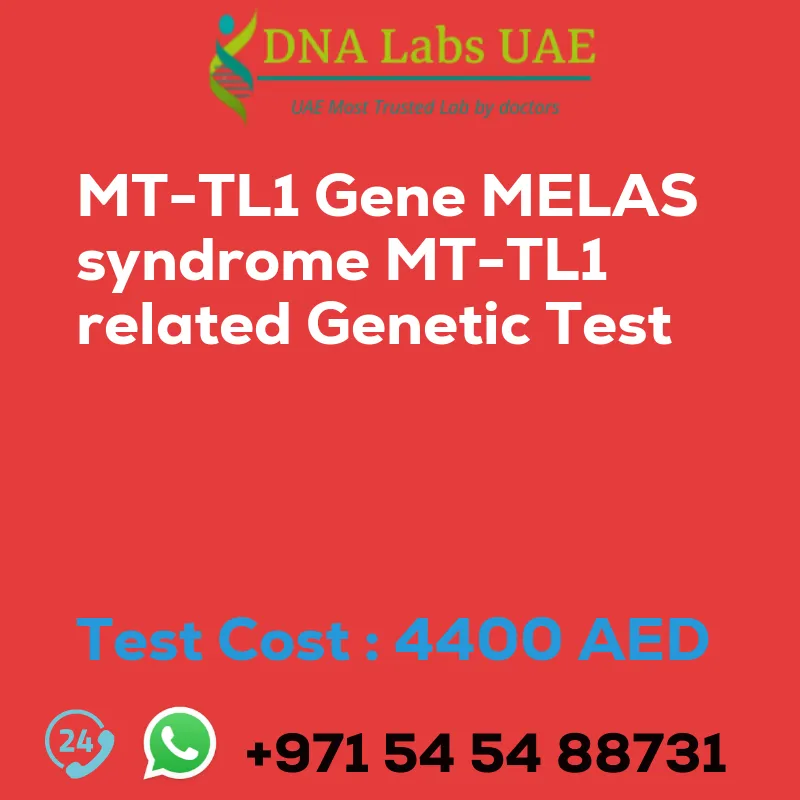MT-TL1 Gene MELAS Syndrome MT-TL1 Related Genetic Test
Components:
- Test Name: MT-TL1 Gene MELAS syndrome MT-TL1 related Genetic Test
- Price: 4400.0 AED
- Sample Condition: Blood or Extracted DNA or One drop Blood on FTA Card
- Report Delivery: 3 to 4 Weeks
- Method: NGS Technology
- Test type: Cardiovascular Pneumology Disorders
- Doctor: Cardiologist
- Test Department: Genetics
- Pre Test Information: Clinical History of Patient who is going for MT-TL1 Gene MELAS syndrome, MT-TL1 related NGS Genetic DNA Test. A Genetic Counselling session to draw a pedigree chart of family members affected with MT-TL1 Gene MELAS syndrome, MT-TL1 related NGS Genetic DNA Test gene MT-TL1
Test Details
MT-TL1 gene, also known as MT-TL1 transfer RNA (tRNA) gene, is associated with a mitochondrial disorder called MELAS syndrome. MELAS stands for Mitochondrial Encephalopathy, Lactic Acidosis, and Stroke-like episodes. MELAS syndrome is a rare genetic disorder that affects the mitochondria, which are the energy-producing structures within cells. It is caused by mutations in the MT-TL1 gene, which leads to impaired production of functional transfer RNA molecules.
The MT-TL1 related NGS (Next-Generation Sequencing) genetic test is a diagnostic tool used to detect mutations in the MT-TL1 gene. NGS technology allows for the simultaneous sequencing of multiple genes, providing a comprehensive analysis of the genetic variations associated with MELAS syndrome. This genetic test involves collecting a sample of DNA, typically through a blood sample, and analyzing it to identify any mutations or variations in the MT-TL1 gene.
The results of the test can help confirm a diagnosis of MELAS syndrome and provide valuable information for managing the condition. It is important to note that MELAS syndrome is a complex disorder with various genetic causes. While mutations in the MT-TL1 gene are a common cause, other genes and factors can also contribute to the development of the condition. Therefore, a comprehensive genetic analysis may involve testing multiple genes associated with mitochondrial disorders.
| Test Name | MT-TL1 Gene MELAS syndrome MT-TL1 related Genetic Test |
|---|---|
| Components | |
| Price | 4400.0 AED |
| Sample Condition | Blood or Extracted DNA or One drop Blood on FTA Card |
| Report Delivery | 3 to 4 Weeks |
| Method | NGS Technology |
| Test type | Cardiovascular Pneumology Disorders |
| Doctor | Cardiologist |
| Test Department: | Genetics |
| Pre Test Information | Clinical History of Patient who is going for MT-TL1 Gene MELAS syndrome, MT-TL1 related NGS Genetic DNA Test. A Genetic Counselling session to draw a pedigree chart of family members affected with MT-TL1 Gene MELAS syndrome, MT-TL1 related NGS Genetic DNA Test gene MT-TL1 |
| Test Details |
MT-TL1 gene, also known as MT-TL1 transfer RNA (tRNA) gene, is associated with a mitochondrial disorder called MELAS syndrome. MELAS stands for Mitochondrial Encephalopathy, Lactic Acidosis, and Stroke-like episodes. MELAS syndrome is a rare genetic disorder that affects the mitochondria, which are the energy-producing structures within cells. It is caused by mutations in the MT-TL1 gene, which leads to impaired production of functional transfer RNA molecules. The MT-TL1 related NGS (Next-Generation Sequencing) genetic test is a diagnostic tool used to detect mutations in the MT-TL1 gene. NGS technology allows for the simultaneous sequencing of multiple genes, providing a comprehensive analysis of the genetic variations associated with MELAS syndrome. This genetic test involves collecting a sample of DNA, typically through a blood sample, and analyzing it to identify any mutations or variations in the MT-TL1 gene. The results of the test can help confirm a diagnosis of MELAS syndrome and provide valuable information for managing the condition. It is important to note that MELAS syndrome is a complex disorder with various genetic causes. While mutations in the MT-TL1 gene are a common cause, other genes and factors can also contribute to the development of the condition. Therefore, a comprehensive genetic analysis may involve testing multiple genes associated with mitochondrial disorders. |








